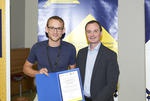Computer scientist receives award for dissertation
Direktzugriff
Artikelaktionen
Yannic Maus (left) received his prize at the annual conference of the German Informatics Society on 26 September in Kassel. Photo: Nicolas Wefers
Freiburg, Sep 27, 2019
For his research on random decisions in distributed algorithms, the computer scientist Dr. Yannic Maus was awarded the dissertation prize from the Gesellschaft für Informatik e.V. (Society for Computer Science), the Schweizer Informatik Gesellschaft (Swiss Computer Science Society) and the Österreichische Computergesellschaft (Austrian Computer Society). The award is endowed with 5,000 euros. With this award, the institutions seek to promote the work of young scientists who represent progress in computer science and who investigate the interactions between computer science and society.
Can random decisions help to solve classical problems in networks? In his dissertation, Maus investigated one of the largest unanswered questions in computer science today. Through his theoretical approach, he has shown how random decisions have been used to solve problems thus far. His work contributes to answering the question whether random decisions are still necessary for such problems in the future. Currently, he is researching in a working group at the Technion Israel Institute of Technology in Haifa, Israel, on the influence of communications restrictions in networks for distributed algorithms.
Yannic Maus studied mathematics and computer science at the RWTH Aachen University and the National University of Singapore. He received his PhD from the Chair of Algorithms and Complexity at the University of Freiburg under the supervision of Prof. Dr. Fabian Kuhn. Since completing his doctorate, Maus has been working as a postdoctoral fellow at the Technion in Haifa.
Contakt:Dr. Yannic MausDepartment of Computer Science Albert-Ludwigs Universität Freiburgyannic.maus@cs.uni-freiburg.de
Fußzeile
Benutzerspezifische Werkzeuge

